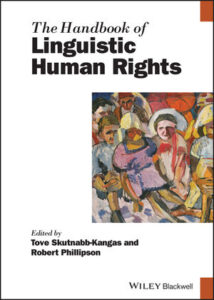ブラックウェル版 言語学ハンドブック
Blackwell Handbooks in Linguistics
言語学・英語学分野における代表的な定番レファレンス・シリーズです。重要分野の最新の研究成果を概観できるように、第一人者の編集の下、第一線の研究者たちが書き下ろしたトピック別のレビュー論文を1巻で多数収録しています。各巻が、各分野のワンストップ・レファレンスであり、学生から研究者まで幅広く利用され、高い評価を得ています。
ブラックウェル版 言語的人権ハンドブック
The Handbook of Linguistic Human Rights

Editors:Tove Skutnabb-Kangas, Adjunct Professor Emerita at Åbo Akademi University, Finland & Robert Phillipson, Professor Emeritus at Copenhagen Business School, Denmark
2022:12 816 p. ISBN 978-1-119-75384-1 (Wiley-Blackwell) -US-
USD 195.00
Web販売価格:税込¥34,054/ 標準価格:税込¥44,187
*2024年7月22日時点の価格です。実際の価格は、為替レートや出版社の都合により変動いたしますので、最新の価格は以下オンラインストアリンクをご参照ください。
*Web販売価格は、紀伊國屋書店BookWeb Proでご注文され、付帯作業を伴わない納品を行い、弊社標準書式による請求書を発行し遅滞なくお支払いただく場合、あるいは、クレジットカードでお支払いいただく場合に適用される販売価格です。
概要
グローバル時代は多文化共生が理想とされるものの、今でも世界中で多くの言語が絶滅の危機に瀕し、多くの人々が母語または継承語で教育を受ける機会を奪われています。1996年にユネスコ後援下で採択された「世界言語権宣言」は、個人および言語共同体が、自らの言語を使用し、教育を保障され、政府の尊重を受け、差別を受けないなどの権利を盛り込み、法的政治的な対応を呼びかけました。こうして注目を浴びた「言語権」(Language Rights)あるいは「言語的人権」(Linguistic Human Rights)の概念は、21世紀の国際社会全体の重要課題として定着しつつあります。
本書は、「言語的人権」についての初のハンドブックです。世界中で言語的人権が侵害されている現状から、言語的正義と言語的多様性を実現していくための理論と方法、事例研究まで、盛り沢山の一冊です。全52章は、国際法、各国法、政治理論、社会学、経済学、歴史学、教育学、障害学といった広汎な分野からのアプローチを網羅します。そのフィールドも、翻訳・通訳、絶滅危機言語、インターネット、地球語としての英語の影響力、語学テスト、災害などの多岐にわたります。
言語・教育・政策を結ぶ重要テーマの基本書として、おすすめいたします。
価格照会・ご購入
※本件についてのお問い合わせ、お見積りについては最寄りの紀伊國屋書店営業所もしくはこちらまでお願いいたします。
収録明細
1. Introduction: Establishing Linguistic Human Rights (Tove Skutnabb-Kangas and Robert Phillipson)
Part I: Approaches to Linguistic Human Rights
2. Linguistic Human Rights in International Law (Robert Dunbar)
3. Sociolinguistic and Political Theory Perspectives on Language Rights (Stephen May)
4. Linguistic and Epistemic Erasure in Africa: Coloniality, Linguistic Human Rights and Decoloniality (Kathleen Heugh)
5. Struggling to Access Health Information in the Midst of a Pandemic: Linguistic Human Rights in Indonesia (Hywel Coleman and David Fero)
6. Economic and Policy Issues in the Promotion of Linguistic Human Rights (François Grin)
7. Preventing the Implementation of Linguistic Human Rights in Education (Tove Skutnabb-Kangas)
8. Debating Linguistic Human Rights in Militarised Myanmar: Political Agitation and Policy Deliberation (Joseph Lo Bianco)
9. Language Policy Implications of ‘Global’ English for Linguistic Human Rights (Robert Phillipson)
10. From Neoliberal to Decolonial Language Rights and Reparative Linguistic Justice (Ahmed Kabe)
Part II International Standards for Linguistic Human Rights
11. Some Shortcomings of Linguistic Rights (Gudmundur Alfredsson)
12. Linguistic Human Rights Challenges in the Work of the UN Special Rapporteur on Minority Issues (Fernand de Varennes)
13. Time, Politics, and Linguistic Human Rights: Bringing Words to our Songs (Elsa Stamatopoulou)
14. Linguistic Human Rights Challenges in the Work of the UN Permanent Forum on Indigenous Issues (Ole Henrik Magga)
15. Linguistic Human Rights in Relation to the Administration of Justice: A European Perspective (Kristin Henrard)
16. Using the UN Human Rights Treaty System to Defend LHRs (Andrea Bear Nicholas, Lorena Fontaine, Amos Key, Jr and Karihwakéron Tim Thompson)
17. The Bangkok Statement on Language and Inclusion: A Rose by Any Other Name? (Kirk R. Person)
18. Linguistic Human Rights in the Work of the World Federation of the Deaf (Victoria Manning, Joseph J. Murray and Alexandre Bloxs)
Part III Case Studies: Linguistic Human Rights Violated
19. Resistance to the Violations of Linguistic Human Rights in Nunavut, Canada (Aluki Kotierk)
20. Linguicide and Historicide (Andrea Bear Nicholas)
21. Linguistic Human Rights for Indigenous Peoples in the USA (Jon Reyhner)
22. Linguistic Human Rights of Minorities in China (Minglang Zhou)
23. Linguistic Human Rights in Tibet: Advocacy and Denial (Gerald Roche)
24. Linguistic, Cultural, and Ethnic Genocide of the Uyghurs in Xinjiang, China (Abduweli Ayup, Shungqar Tékin and Erkin Sidick)
25. Linguistic Human Rights in Kurdistan (Jaffer Sheyholislami)
26. The Linguistic Human Rights Plight of Hungarians in Ukraine (István Csernicskó and Miklós Kontra)
27. A Tale of Two Springs and an Impending Winter: Linguistic Human Rights and the Politics of Dignity in North Africa (Ahmed Kabel)
28. English Linguistic Imperialism and Mother Tongue Medium Education in Ethiopia (Yirga G. Woldeyes)
29. Judicial Interpretations of the Law to Safeguard Linguistic Minorities in India (E. Annamalai)
30. Linguistic Human Rights and Higher Education: Reflections from India (Shivani Nag)
31. Language Matters for Development, Peace, and Reconciliation: The Case for Change in Haiti (Dominique Dupuy)
32. Romani Emancipation and Linguistic Human Rights (Dieter W. Halwachs)
Part IV: Case Studies: Implementing Linguistic Human Rights
33. Finnish and Swedish as National Languages of Finland: A Linguistic Human Rights Success Story – Why and How? (Markku Suksi)
34. When Implementation of Linguistic Human Rights Does Not Match Legislation – The Case of Sweden (Jarmo Lainio)
35. Court Challenges and Linguistic Human Rights: The Canadian Case (Pierre Foucher)
36. Linguistic Human Rights of Indigenous Sámi in the Finnish Education System (Ulla Aikio-Puoskari / Gáppe Piera Jovnna Ulla)
37. A Time of Promise in Latin America: Linguistic Human Rights from within Language Communities (Gabriela Pérez Báez and Yásnaya Elena Aguilar Gil)
38. Pueblo Revitalisation in Education in Southwest USA (Christine Sims)
39. Language Endangerment and Linguistic Human Rights of a Cross-Border Minority: Karelian in Russia and Finland (Anneli Sarhimaa)
40. Linguistic Human Rights in Russia (Janne Saarikivi)
41. Challenges in the Acknowledgement and Implementation of Linguistic Human Rights in Nepal (Lava Deo Awasthi, Mark Turin, and Yogendra Prasad Yadava)
42. Linguistic Human Rights in Education in India: Odisha’s Partial Success Story (Ajit Mohanty)
43. Language Rights as Human Rights in Aotearoa New Zealand (Richard Benton)
44. The History of Linguistic Human Rights at Gallaudet University (Tawny Holmes Hlibok and Laurene E. Simm)
Part V: Cross-cutting Issues in Linguistic Human Rights
45. The Role of Interpreting and Translation in Promoting Linguistic Human Rights (Gabriel González Núñez)
46. Language Testing/Assessment and Linguistic Human Rights (Elana Shohamy)
47. Promoting Linguistic Human Rights Through Language Documentation (M. Paul Lewis)
48. Linguistic Human Rights, Living Tongues Institute for Endangered Languages, and the Rise of the Multilingual Internet (Gregory D.S. Anderson and Anna L. Daigneault)
49. Disaster Linguicism as Deprivation of the Victims’ Linguistic Human Rights (Shinya Uekusa and Steve Matthewman)
50. Linguistic Human Rights and the Imperative to Remember in the Philippines (Ruanni Tupas)
51. Existential Evidence: A Compilation (Tove Skutnabb-Kangas and Robert Phillipson)
52. Afterword: Pursuing Linguistic Human Rights (Robert Phillipson and Tove Skutnabb-Kangas)
(学術洋書部)